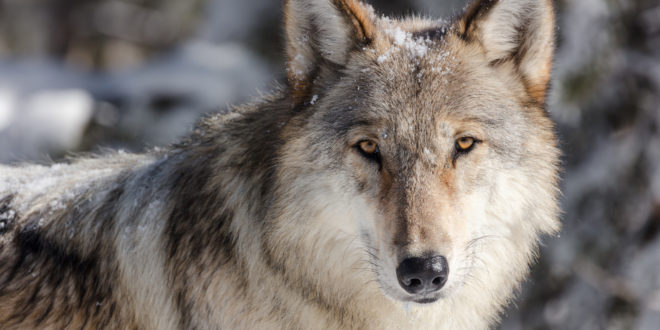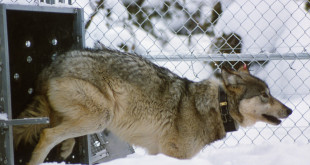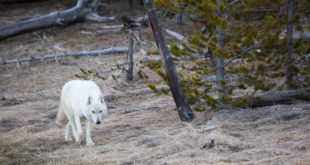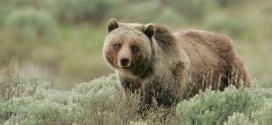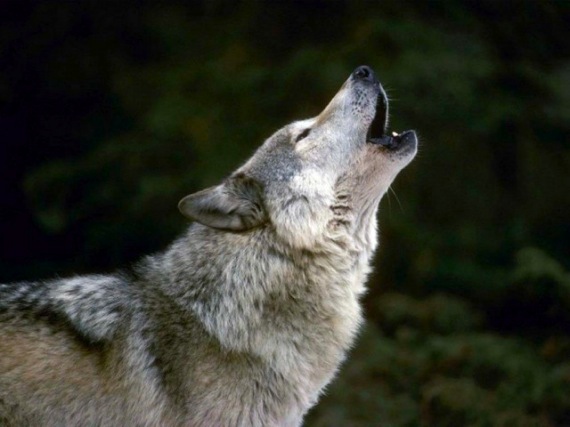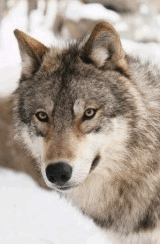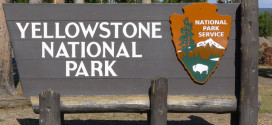Arguing that the presence of wolves in the Yellowstone region is a economic asset, a local group of businesses is asking Montana to scale back trapping and hunting of wolves in the area.
The Wild Livelihoods Business Coalition has been reaching out to Montana Fish and Wildlife Commission members and U.S. Fish and Wildlife Service officials about reverting wolf-hunting guidelines back to previous levels. The group, made up largely of businesses in the Yellowstone gateway cities of Cooke City, Gardiner, Livingston and West Yellowstone, say that with so many tourists heading to the Yellowstone region to view wolves, it’s in the region’s economic self-interest to limit hunting and trapping. The state manages wolf populations across the state via Wolf Management Units, and in 2020 180 wolves were killed across there state, with 34 killed in the three WMUs adjacent to Yellowstone. Of those, 20 were identified as members of Yellowstone wolf packs that had wandered across park boundaries–the most in a season since wolves were reintroduced to Yellowstone. It’s a count that led to the elimination of one pack, the Phantom Lake Pack.
That impact on the wolf population was raised by Yellowstone Park Superintendent Cam Sholly, per AP:
Park Superintendent Cam Sholly first raised concerns last September about wolves dying near the park border. He recently urged Republican Montana Gov. Greg Gianforte to shut down hunting and trapping in the area for the remainder of the season.
Sholly cited “the extraordinary number of Yellowstone wolves already killed this hunting season,” in a Dec. 16 letter to Gianforte released to AP under a freedom of information request.
Gianforte, an avid hunter and trapper, did not directly address the request to halt hunting in a Wednesday letter responding to Sholly.
What the Wild Livelihoods Business Coalition is arguing: a return to much lower quotas for wolf harvesting in the WMUs adjacent to Yellowstone and reverting to traditional Yellowstone wolf management limits. It’s a pretty simple request based on an economic argument: with so many visitors to the Yellowstone region intent on wildlife sightseeing, it makes little sense to slaughter one of the prime players in this tourism. From the Billings Gazette:
Jeff Reed, who farms and runs a lodging business on the banks of the Yellowstone River north of the park, said the coalition isn’t interested in arguing whether wolves should revert to federal management for protection under the Endangered Species Act, as several conservation and wildlife groups have called for. Instead, his group is focused on the “out of proportion harvest” of wolves from such a small area.
“We’re not anti-hunting,” Reed said. “I hunt.”
Instead, he said the group is hoping to encourage the commission to consider “nonconsumptive use” as a management objective in places close to the park where wildlife have a demonstrated tourism value beyond hunting.
Indeed, the Wildlife Livelihoods Business Coalition makes quite a detailed case for protecting wolves under the guise of economic development; check it out here. Ultimately, this debate features the same dynamics as every other wildlife-management issue in Montana, including bison harvests: the interests of stockmen and other old-style businesses vs. tourism-centric advocates that would cut some slack on wildlife wandering beyond the Yellowstone boundaries.
Image courtesy National Park Service.
 Yellowstone Insider Your Complete Guide to America's First National Park
Yellowstone Insider Your Complete Guide to America's First National Park
